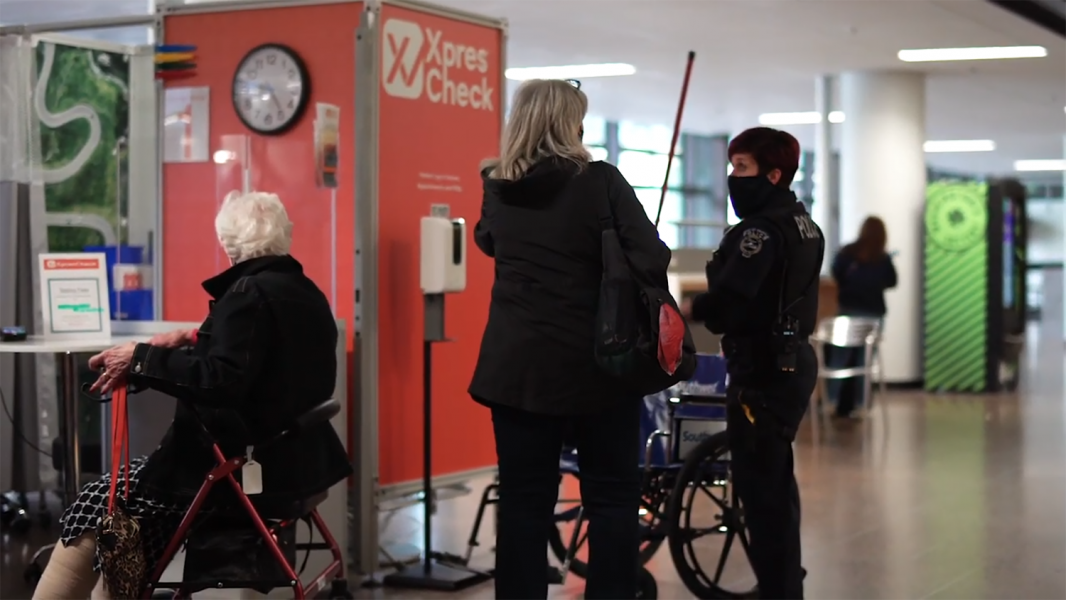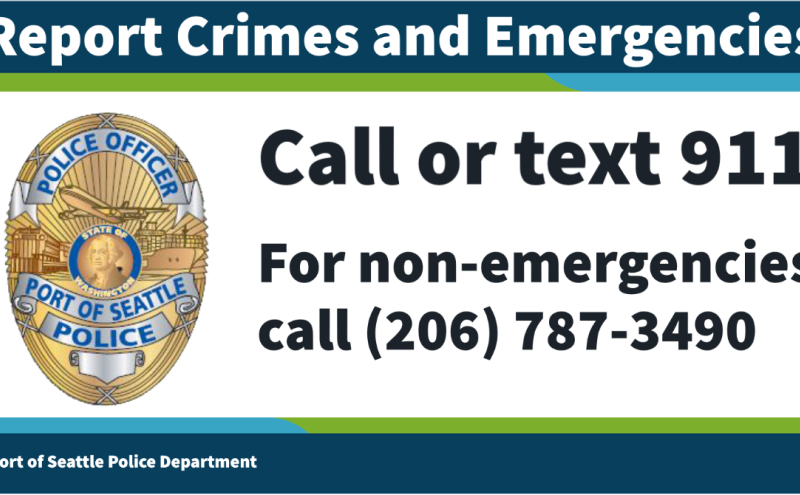
Along with Seattle and King County, Seattle-Tacoma International Airport (SEA) is experiencing an increase of unhoused persons seeking shelter. The Port of Seattle, which owns and operates SEA, recognizes the complexities of this regional challenge to support people in crisis.
This increase comes at a time when the Port is already examining how it responds to people experiencing homelessness. An assessment by the Port of Seattle’s Task Force on Port Policing and Civil Rights recommended that the Port examine opportunities for moving away from a traditional police response on homelessness as a key strategy for reducing external disparities around the use of force.
In response, we are implementing a multi-faceted approach called SEA Cares that supports safety in the airport and compassionately connects those in crisis to regional services.
SEA Cares in action
SEA Cares is a new initiative to take immediate steps to ensure the safety of travelers and airport employees while developing a long-term strategy for responding to and assisting people in crisis.
Through the Task Force recommendations and work of SEA Cares, we are piloting a Crisis Coordinator role within the Port of Seattle Police Department (POSPD) for the next three years. The Crisis Coordinator, Michelle Bregel, is trained in responding to those needing specialized assistance as well as deeply engaged with regional organizations to provide direct assistance to people in distress. Previously Bregel led a social services team at King County's Department of Community and Human Services, providing emergency financial assistance, employment assistance, housing/emergency shelter assistance, crisis intervention services, connections to resources, and multiple other services to veterans experiencing homelessness in King County.
Bregel, a certified Crisis Intervention Specialist II and Advanced Crisis Negotiator, monitors radio traffic, responds to crisis calls, and serves as a key resource for police officers, local outreach organizations, and community programs. She works directly with people in need and develops follow up plans to help them get the help they need. By responding to crisis calls, she frees up patrol officers to respond to other priority calls. Bregel can also help identify when additional police response is necessary.
Beyond her day-to-day responsibilities, Bregel researches best practices and develops recommendations to help people who use the airport as emergency shelter and reduce the chances of repeat crimes associated with that population.
“As crisis coordinator, I can present information in a way that reflects my ability to view the situation through a social service lens and a criminal justice lens. This is important because while homelessness is not a police issue, at times appropriate policing actions need to be taken,” Bregel said.
A personal approach

Bregel works with each person’s individual situation to help determine the best path forward.
“I recently worked with an individual who had committed a theft in the airport. I was able to connect him to a case manager at a local social service agency who assisted him in a diversion plan that included helping him travel back to his family in Texas. Once there, he would no longer be experiencing homelessness and could get treatment for his substance use issues as well as find employment.”
Bregel’s background gives her the skills to communicate effectively with people in crisis.
“Part of my work is focused on reducing the likelihood of people using the airport as emergency shelter and the number of crimes associated with it. My role also helps people get connected to behavioral health resources. When people are connected to resources and provided with access to wrap-around services, barriers to becoming self-sufficient are removed.”
Safety upgrades
SEA Cares is taking immediate steps to ensure the safety of travelers and airport employees while developing a long-term strategy over the next few years for responding to and assisting persons in crisis. Our teams within the Port of Seattle are working with the King County Mobile Crisis Team, the City of SeaTac, and social service agencies.
This combined multi-faceted effort is already underway with further resources being added in 2022.
In addition to Bregel’s work as Crisis Coordinator, the airport added a team of Public Support Specialists to monitor terminal entry points overnight and be a visible point of contact. A partnership with King County Mobile Crisis Team and other social service agencies facilitates resource connections for people experiencing homelessness as well as working with nearby cities.
This year we will onboard a Port of Seattle Mental Health Responder and develop a co-responder program with the POSPD Crisis Coordinator, King County Designated Crisis Responders and King County Mobile Crisis Teams that incorporates mental health response.
This strategy addresses safety at the airport with more compassionate and effective tactics.
“My work makes SEA a safer place for all because I am able to de-escalate situations that could present a safety issue for employees and the public,” Bregel said. “(POSPD) and the Port are supportive of the work I am doing, which makes it much easier when everyone is on board.”
How to get help
Reporting is essential to maintain public safety at SEA.
- If you experience anything that makes you feel unsafe or require emergency assistance, call or text 9-1-1 to be connected to the Port of Seattle Police Department, for non-emergencies please call (206) 787-5401
- If you work at the airport, help us keep SEA safe, secure, and clean by directly reporting custodial, security and maintenance concerns. Text-a-tip to 206-785-1876 or download the See Say Airport App to send photos, videos, and a message to airport operations
- If you are a person in crisis, call Crisis Connections at 866-427-4747 for 24/7 hour support









